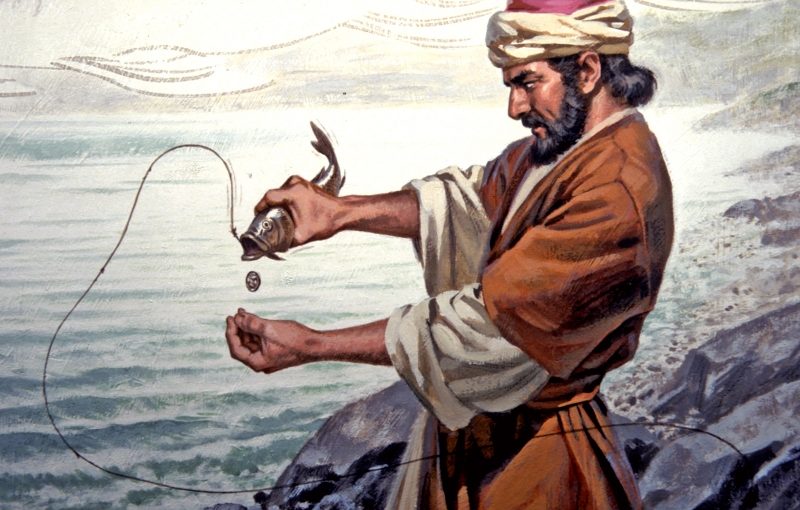Today’s Reading: Matthew 17
At the end of Matthew chapter 17 something very interesting to happens. At least interesting to me, I hope you will find it interesting and profitable too. It starts when “they that received tribute money” came to Peter to ask of Jesus “Doth not your master pay tribute?” (Matthew 17:24)
When Peter came to Jesus to inquire of him on this matter. Jesus spoke before Peter and asked him:
What thinkest thou, Simon? of whom do the kings of the earth take custom or tribute? of their own children, or of strangers? (Matthew 17:25)
Peter answered “Of strangers.” That is, they tax not those of their own family but those outside their house.
Peter saith unto him, Of strangers. Jesus saith unto him, Then are the children free. (Matthew 17:26)
Some think this was Jesus making it clear that because He was the Son of God the tax does not apply to Him. This is why some believe the tax matter was a temple tax and not a civic tax.
Jesus then said “notwithstanding”, which I take to mean some version of, even though I am not required too. Then Jesus said “lest we should offend them” and then proceeded to describe the precise manner in which they would procure the tribute money for payment.
At first glance the phrase “lest we should offend them” could be taken as a reinforcing statement of what Jesus first said; “notwithstanding”. In this case the “them” would be referring to the tax collectors. Instead though, let us consider for a moment that the “them” was actually in reference to the strangers that Peter mentioned. If this were the case, I think the statement may be more linked to the manner in which they are procuring the payment and not a repetitive statement describing why they are in fact going to pay. After all Jesus just got done explaining why they did not need to. So, if it is in fact about how they are going to procure the payment, the question then became for me, why is this so important? For that answer I turn back to Jesus’s explanation, “Lest we should offend them.” And this is where it got so interesting to me.
Here is what I think we may be seeing. Coming up with the money to pay the tax is certainly not a problem for Jesus. I think it is reasonable to say He could have done it in any number of ways. One thought is that he would simply lift His hand up to the sky and ask for it to be created. But the issue with creating is that it wouldn’t be fair.
Creating money in any system and increasing the money supply is simply stealing from those who hold money. It is debasing the currency, which basically means everyone else’s money would than be worth less. God pronounces this as a curse and judgement in Isaiah 1:22. Instead, I think Jesus in his sovereignty and absolute authority knew about a coin that no one had a claim to and commanded it brought to Peter. This way they would not offend anyone, or hurt anyone by decreasing the value of their coins, in paying the tax.
There is of course a strong possibility I am way off here. Perhaps reading too much into things. But on the other hand, perhaps this is why the manner in which they paid the tax was described in so much detail and why it was important for Jesus to break down who the groups involved in the tax were and how they all relate to each other. Perhaps it was to continue to lead us in the way we should go. To give us another example of God’s law applied to this world. For me, yet another reassurance that God is all knowing, all powerful, and above all. Praise God!
Here is a link to the scripture: Matthew 17:24-27
